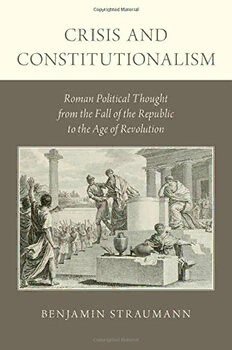
Crisis and Constitutionalism: Roman Political Thought from the Fall of the Republic to the Age of Revolution PDF
Preview Crisis and Constitutionalism: Roman Political Thought from the Fall of the Republic to the Age of Revolution
Crisis and Constitutionalism Crisis and Constitutionalism Roman Political Thought from the Fall of the Republic to the Age of Revolution z BENJAMIN STRAUMANN 1 1 Oxford University Press is a department of the University of Oxford. It furthers the University’s objective of excellence in research, scholarship, and education by publishing worldwide.Oxford is a registered trade mark of Oxford University Press in the UK and certain other countries. Published in the United States of America by Oxford University Press 198 Madison Avenue, New York, NY 10016, United States of America. © Oxford University Press 2016 All rights reserved. No part of this publication may be reproduced, stored in a retrieval system, or transmitted, in any form or by any means, without the prior permission in writing of Oxford University Press, or as expressly permitted by law, by license, or under terms agreed with the appropriate reproduction rights organization. Inquiries concerning reproduction outside the scope of the above should be sent to the Rights Department, Oxford University Press, at the address above. You must not circulate this work in any other form and you must impose this same condition on any acquirer. Library of Congress Cataloging-in-Publication Data Names: Straumann, Benjamin, author. Title: Crisis and constitutionalism : Roman political thought from the fall of the republic to the age of revolution / Benjamin Straumann. Description: New York, NY : Oxford University Press, 2016. | Includes bibliographical references and index. Identifiers: LCCN 2015028298 | ISBN 978–0–19–995092–8 (hardback) | ISBN 978–0–19–995093–5 (e-book) Subjects: LCSH: Constitutional history—Philosophy. | Roman law—Influence. | Constitutional history—Rome. | Rome—Politics and government—265–30 b.c. Republicanism—History. | Political science—Philosophy. | BISAC: HISTORY / Ancient / Rome. Classification: LCC K3161 .S767 2016 | DDC 342.37—dc23 LC record available at http://lccn.loc.gov/2015028298 1 3 5 7 9 8 6 4 2 Printed by Sheridan, USA In memory of my parents, Ruth Reichstein (1933– 1989) and Bruno Straumann (1924– 2000) Contents Preface and Acknowledgments ix Introduction: The Fall of the Roman Republic and the Rise of Constitutional Thought 1 PART I: Inchoate Constitutionalism in the Late Roman Republic 23 1. “Not Some Piece of Legislation”: The Roman Concept of Constitution 27 2. Infinite Power? Emergencies and Extraordinary Powers in Constitutional Argument 63 3. “The Sole Bulwark of Liberty”: Constitutional Rights at Rome 118 PART II: A Hierarchy of Laws: Roman Constitutional Theory 147 4. Cicero and the Legitimacy of Political Authority 149 5. Greek vs. Roman Constitutional Thought 191 PART III: The Limits of Virtue: The Roman Contribution to Political Thought 239 6. The Roman Republic as a Constitutional Order from the Principate to the Renaissance 241 viii Contents 7. Neo- Roman Interlude: Machiavelli and the Anti- Constitutional Tradition 260 8. Jean Bodin and the Fall of the Roman Republic 278 Epilogue: Constitutional Republicanism, the “Cant- Word” Virtue and the American Founding 303 Bibliography 343 General Index 373 Index Locorum 403 Preface and Acknowledgments Those living in political orders that are also constitutional orders tend to take the ideas developed by Roman constitutional thought for granted. Constitutionalism, like vaccination, perennially runs the danger of falling vic- tim to its own success. But, as Roman writers and thinkers of the last century of the Republic knew all too well, political orders can and do collapse. The crises and eventual collapse of the Roman Republic were one of the pivotal moments in European political and intellectual history. How and why did this vast, success- ful republican political order fail? From Cicero and his contemporaries onward, this question has attracted the interest of some of the best and most interesting political thinkers. One influential answer, already put forward by some of the ancients, was that luxury, corruption, and the loss of virtue were to blame. A very different answer was lurking in Roman historiography, Polybius, and, more explicitly, in some of Cicero’s philosophical works: the crises of the late Republic had been of a constitutional nature and could be solved by constitutional means alone. The idea of a constitutional order, that is to say, a political order based on rules and institutions that are themselves not subject to the political process; are more firmly entrenched than mere legislation; and rest on a normative justifica- tion that is substantive, not merely procedural— this idea found resonance in the history of political thought as a result of, and as an answer to, the crisis of the Roman Republic. Roman constitutional thought could build on an inchoate constitutionalism already implicit in the Roman republican political order and its highly legalized political negotiations. It was further developed and made explicit in Cicero’s works, and found a very perceptive audience in all those political thinkers from the fourteenth century onward who preferred the Roman republican order to the Empire. The fall of the Roman Republic remained the central point of interest for thinkers who sought constitutional remedies to problems of political order. Jean Bodin, usually misunderstood as simply an absolutist thinker, was really a key exponent of the tradition of Roman political thought emanating from the
